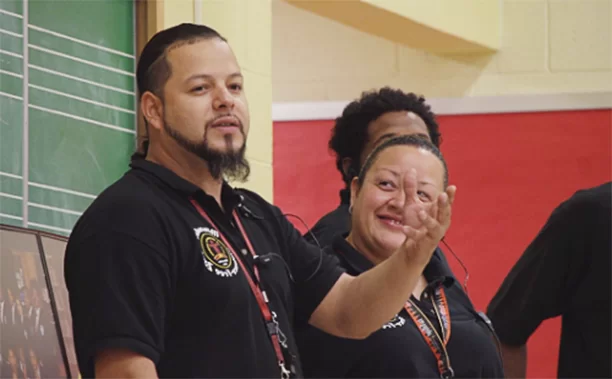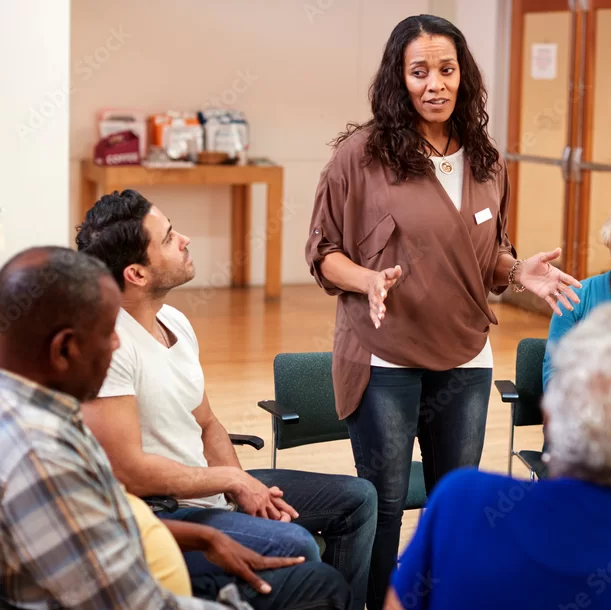
Intro
Violence Free Zone
The Violence Free Zone is the national model of a youth violence reduction and high-risk student mentoring program created by the Woodson Center. Designed to operate in the most trouble-plagued schools in urban centers with high levels of crime and violence, the VFZ has produced measurable decreases in violent and non-violent incidents and suspensions in more than 30 schools across the country. The principles developed in the Violence Free Zone model have also proved applicable to suburban and rural communities.
Impact
Proven Impact
Three studies by evaluators from Baylor University reported that the VFZ had measurable impact in improved safety, reduction in suspensions and truancies and increased academic performance. Educators and law enforcement officers from sites around the country have praised the VFZ for changing the culture of previously violent schools and reducing crimes in surrounding neighborhoods, beyond school grounds. According to Milwaukee Police Department (2010), the number of auto thefts decreased by 25% between academic years 2006-07 (i.e., pre-VFZ) and 2007-08 (i.e., post-VFZ), while citywide reduction in auto thefts during this same time period decreased by only 6% within 1,000 feet of schools implementing VFZ programs on or before November 2007.
Impact
Reduction in suspensions
Increased academic performance
Reduction in truancies
Improved safety

Endorsed
Endorsements
National Gang Center endorses Violence Free-Zones (VFZ) effectiveness based on the program’s: Promising gang structure. To be included in the Office of Juvenile Justice and Delinquency Prevention’s Review of Promising and Effective Juvenile Delinquency and Youth Gang Programs and receive endorsement as a Level III Program (promising or effective program structure), the VFZ program successfully met five areas of eligibility for inclusion:
- Involves a prevention, intervention, or suppression program
- Aims to explicitly reduce or prevent gang-related behavior; or if not, applied to a juvenile at-risk population
- Involves youth under the age of 21
- Involves a comparison condition
- Date of supporting study publication is 1950 or later
To learn more about the criteria for this rating, click here.
How
How it Works
The goal of the Violence Free Zone initiative is to reduce violence and disruptions in the schools and prepare students for learning. The Center provides overall management and direction to the Violence Free Zone initiative sites and selects established youth-serving organizations to be WC’s community partners and implement the VFZ program in the schools. These organizations have the goal of stopping violence in their neighborhoods and have demonstrated that they have the trust and confidence of young people. The Center provides training in the Violence Free Zone national model as well as technical assistance, administrative and financial oversight, and linkages to sources of support. Central to the program are the Youth Advisors, mature young adults who are from the same neighborhoods as the students in the schools they serve. The Youth Advisors command respect because they have faced and overcome the same challenges as the students. Carefully screened, hired, and managed by the local community-partner organization, the Youth Advisors work in the schools as hall monitors, mediators, and character coaches, and they mentor the high risk students that often are responsible for disruptions.
The Youth Advisors
The objectives of the Youth Advisors who mentor high risk students are to guide them to positive paths and encourage their personal, academic, and career success. Depending on the school size, a team of from seven to twelve Youth Advisors is assigned to each school, one of whom is selected as the VFZ School Site Supervisor. Youth Advisors are recruited from the community through word of mouth, among youth workers and other nonprofit organizations, and occasionally through advertisement. Each Youth Advisor is chosen for his/her genuine “heart” for young people who are struggling, and for his/her ability to understand and relate to their issues. The prospective Youth Advisors are carefully screened by VFZ staff for their suitability and experience, and must pass all school system, state, and local screening requirements. They then undergo a comprehensive course of training in VFZ procedures, code of conduct, and on how to handle various situations.Before being employed they intern and shadow an experienced Youth Advisor. School Site Supervisors participate in a regular videocam teleconference led by the WC National VFZ Program Director to receive information and share best practices.
What the Youth Advisors Do
The VFZ Youth Advisors work closely with and support school safety staff, police School Resource Officers, teachers, and counselors, adding a new layer in a comprehensive system of support. They greet the students each day and work as cafeteria and hall monitors, encouraging students to get to class and enforcing dress and behavior codes. They respond if teachers ask for assistance in calming a class. They are able to defuse conflicts before they erupt into violence. Because the Youth Advisors are trusted and respected, the students respond to them and share confidences with them in ways that are not seen by the students as “snitching,” thereby making it possible to head off dangerous situations.
If requested by the schools, the VFZ Youth Advisors oversee a special “suspension room,” where students under suspension are carefully supervised and given homework and discuss behavioral issues. This ensures that the student will maintain his or her schoolwork in a disciplined setting rather than being unsupervised at home or on the street. In some of the schools, suspended youths are assigned to meet with VFZ staff upon their return to school to work out issues that might have led to their suspension. In some schools, VFZ Youth Advisors manage a “tardy room,” also with the goal of identifying and helping resolve students’ reasons for being tardy. If students are truant for more than a day, Youth Advisors will call their homes and try to address the reasons.
Typical Youth Advisor Day
Morning Greeting:
The Youth Advisors welcome each child with an encouraging word as they arrive at the school. They also look for signs of tension or that a student needs someone to talk to.
Game Room:
Offering a safe and enjoyable environment for students in school where they can also talk with Youth Advisors.
Violence Free Zone Meetings:
During free period or lunch meetings students come to talk out problems and receive motivational and character coaching.
Supportive Conversations, Mediations, Conflict Resolution, and Interventions:
Youth Advisors respond throughout the day to problems presented by students or school staff.
Tutoring:
Youth Advisors offer homework assistance and where possible, tutoring.
Safe Passage:
Youth Advisors assist the school staff and security officers outside the schools, even walking students home if needed, to ensure safe passage. They also watch for outsiders who may gather outside the school buildings to cause trouble and they work to defuse tensions.
After-School Programs:
Individual sites have established a variety of creative programs to motivate young people, including sports programs, positive “rap” clubs, and discussion and activity groups focusing on issues concerning youth.
Qualifications
- Must be at least 18 years old
- Must pass a background check with no sexual offenses or crimes against children
- Must know the culture of the community
- Have at a minimum a GED or working towards one
- Must pass a health examination (communicable diseases) and TB test
- Must pass a drug and alcohol test (given periodically)
Training
- Child Abuse and Sexual Misconduct Training
- Character Development Training
- Conflict Resolution Training
- Leadership Development Training
- School System Policies Training
- Youth Advisor Training
- Weekly Peer Meetings to Share Approaches
Resources
Origins of the VFZ
Starting a VFZ
VFZ Manual
More
More Information
The Center has created an extensive data collection protocol and receives data from school and police officials to provide a comparison between before and after the Violence Free Zone program is initiated and to track the progress of individual students.
The Violence Free Zone is supported by public and private funders. The Center raises funds nationally and negotiates contracts with local school systems and police departments. It also helps the community partners raise funding from local foundations and businesses.
Results
Full Evaluations
Where
Information About VFZ Sites
The Woodson Center (WC) works to bring recognition, training and funding to community-based leaders and organizations to strengthen their efforts to uplift their neighborhoods and to create venues for the exchange of best practices.
VFZ Sites
Baltimore, Maryland
Milwaukee, Wisconsin
Racine, Wisconsin